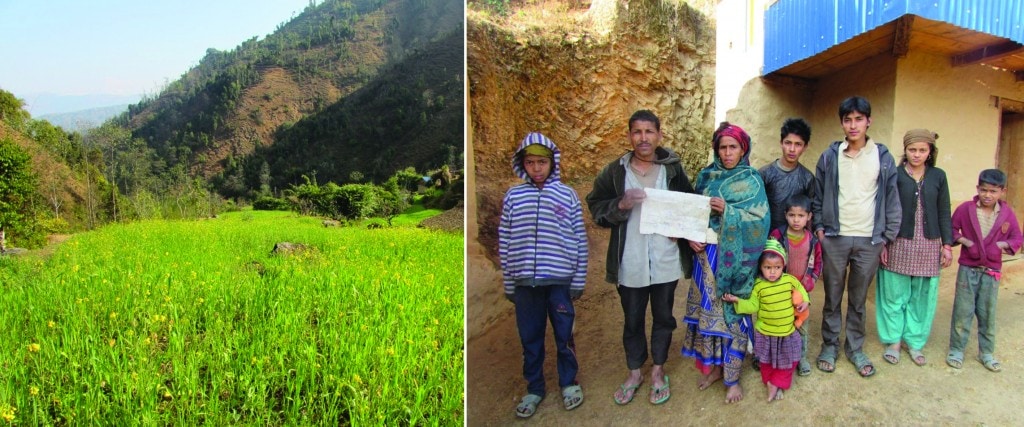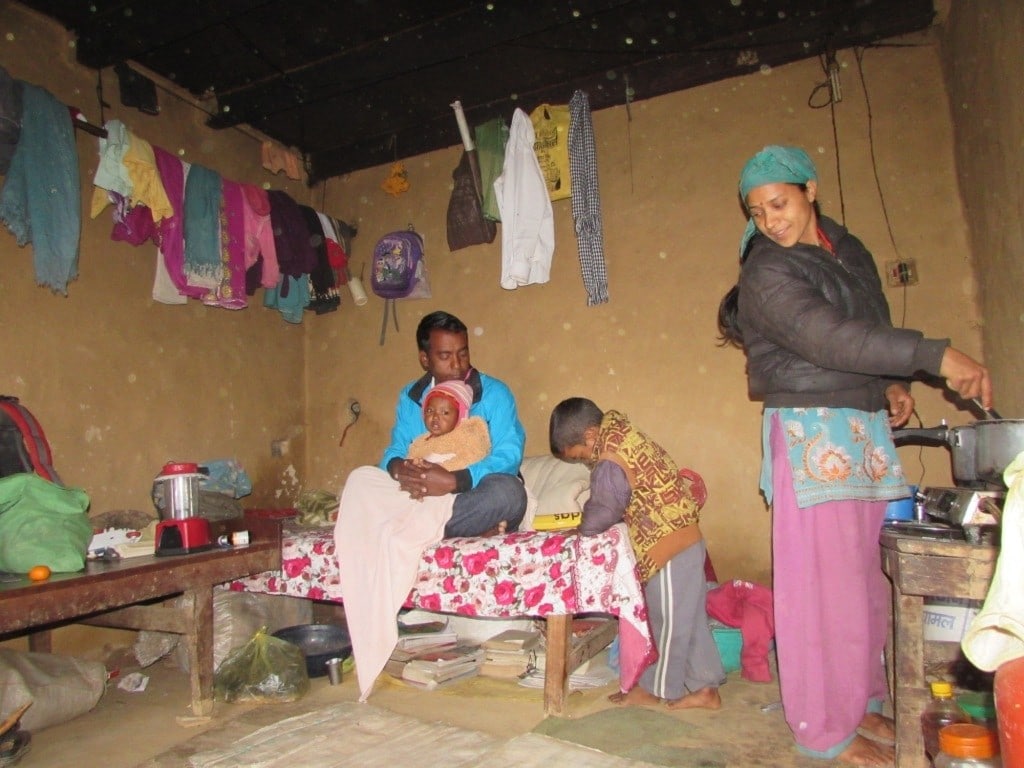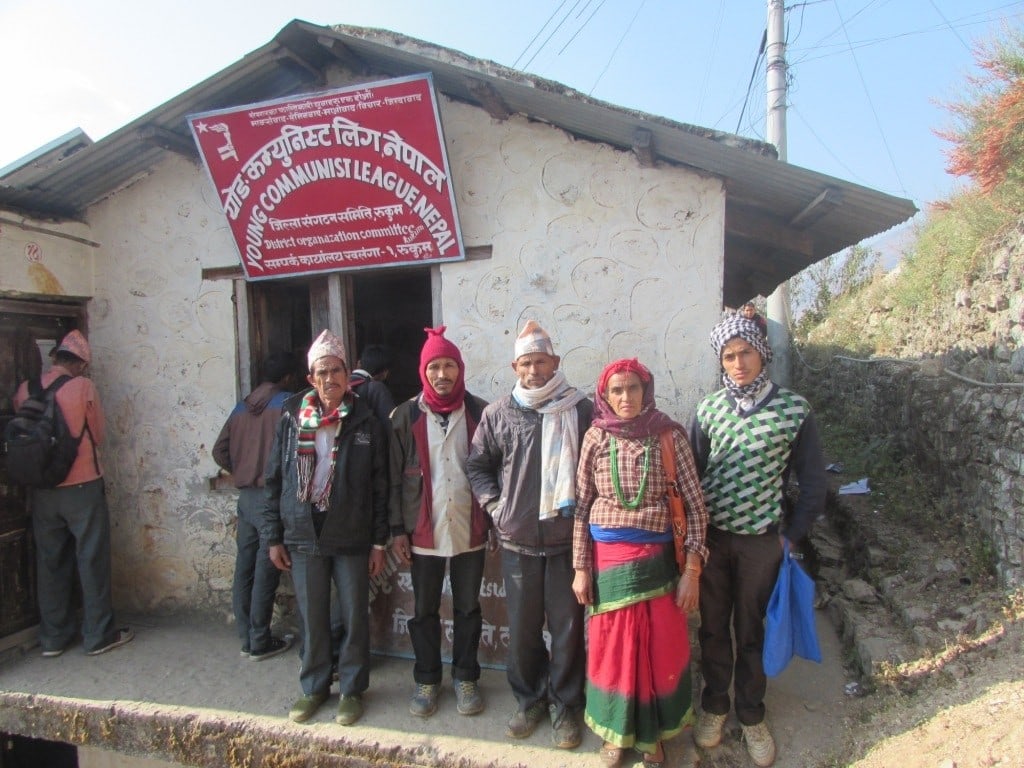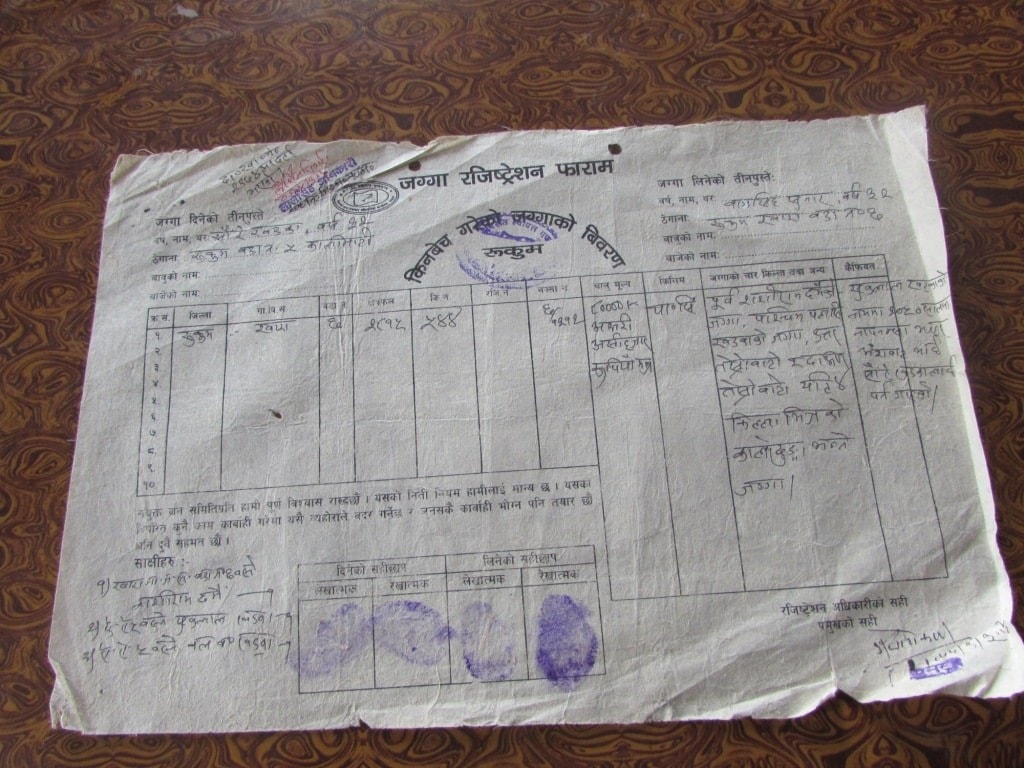People in the mid-western hill district,forced to purchase properties under ‘People’s Government’ during the insurgency, are facing evection due to question over its validity.There are 3500 families suffering in Rukum district alone.
HARI GAUTAM– Centre for Investigative Journalism
Two weeks back, Prime Minister KP Oli signed a 9-point deal with UCPN-M Chairman Pushpa Kamal Dahal, which salvaged his government. There was a conspicuous clause no 5 in the deal, which raised few eyebrows. When CIJ investigated the matter, it unfolded as a tragic tale that has affected thousands of lives in one of Nepal’s worst conflict hit districts.
The land Man Bahadur Khatri purchased from Padam Bahadur Batha, which was registered with Janasatta in 2003.The district court has invalidated the transactions done under the Maoist Janasatta and ruled against Man Bahadur, but the family (right) refuses to give up the land and claim they have been victimized.
Sharma admits, ‘The party failed its people. It is up to the leaders at the centre to find a solution.
Janasatta's activities of the past has come back to haunt the party and it is more evident in Rukum. While the party’s reputation has been damaged badly, it is Rukum’s locals who are bearing the huge loss because Nepal’s constitution, land laws, and justice system does not recognise decisions taken by Janasatta
Dhan Bahadur BK of Garayala survived the decade-long conflict but the peace process has made him a refugee. While displaced people all over the country were returning back home after the war ended in 2006, Dhan Bahadur was forced out of his own house.
On 11 June 2004, Dhan Bahadur had bought 1,010 square metres of land, numbered 99 on official papers, from Rane Kami for Rs 173,000. Instead of going to the District Land Office he went, like everyone else, to the Janasatta to register his purchase.
One fine morning in 2010, when Dhan Bahadur was preparing to harvest wheat from the fields, another person from the village Tauke Kami ordered him to evict his property, claiming the fields were hers. Rane Kami had re-sold the land to Tauke Kami for Rs 1 million.
Dhan Bahadur fought for his land, while the harvest went to waste. He even went to the District Land Office, but was shown the government records that validated Tauke’s purchase.
Dhan Bahadur refused to leave the property, arguing that he was the rightful owner. On 24 August, 2011 Tauke Kami lodged a writ petition against BK and his mother Kali at the district court, which ruled in her favour. Dhan Bahadur persisted even after the ruling, but Tauke moved to court again after which he was forced to evict.
Dhan Bahadur now lives with his family in Rukum’s headquarters as a landless squatter. He lost his land and he lost another 300,000 rupees fighting the case.
He repeatedly requested the Maoist leaders to help him recover his land. “I even met Baburam Bhattarai and Janardan Sharma when they were in power, but nothing worked.” says BK. “I regret going to the people’s government.”
Man Bahadur and Lalmati Khatri of Khara face similar problems. They have been living in constant fear of eviction, ever since finding out someone else holds the rights to the land they have been tilling for the last 22 years. Like BK, the Khatri couple also obeyed the Janasatta . They had already made a mistake of not obtaining official papers after purchasing the land in 1992, before the conflict began. Nine years later, he was forced into another.
In the evening of November 2001, a Maoist cader came to his house and asked him to sign the land papers. Man Bahadur refused. The next morning the Janasatta organised a program at the nearby Andhanashak High School and made fanfare of forcibly registering land purchases of Khatri and a few others.
“ I would have got my land officially registered but the Maoists stopped me from going to the government,” says Man Bahadur. “Against my wishes I was forced to register the transaction with the Janasatta . Now they say my land has gone back to the previous owner.”
“I bought the land from my neighbour Padam Bahadur Batha for Rs 14,000 and spent Rs 100,000 to level it for farming,” says Man Bahadur. The land was of special value for the Khatris because they bought it immediately after their first child Bishnu was born. Today, Bishnu is labouring hard in India to cover the legal costs of fighting for the same piece of land.
As the Maoists’ initial surge to power took a dip, the person who had sold the land to Man Bahadur saw an opportunity and lodged a complaint at the district court in 2014, claiming ownership of the land. In 2015, court decided the land belonged to Batha stating that the wartime transactions sanctioned by a non-government entity did not have a legal standing. But, Man Bahadur refuses to leave the land he has owned and tilled for 22 years.
“I don’t care what the court decides, I am not going to leave this land as long as i leave,” he says. “I have been cheated, I must get justice.”
He expresses his bitterness with the Maoists, “They stopped me from going to the government, and now they refuse to help me out”.
Dhan Bahadur BK's family squatter in district headquarter Khalanga after being evicted from their own land.
There are many more (see box at end) like Dhan Bahadur, Man Bahadur, and Bhim Bahadur who have lost their land after court rulings. Land and houses that the buyers thought they owned are being handed over to their old owners throughout the district. All the decisions taken so far by the district court has been in the favaour of sellers. At least 3,500 families are in danger of losing their land and livlihood.
“Buyers only have < Janasatta paper, while sellers have official government papers,” says advocate Yakka Bahadur Pandey. “It is an easy decision for the courts.”
It is difficult to find honest people that respect the deals done back then. Bir Bahadur Oli is among those rare few. Oli, who sold his land under the Janasatta says, “Dignity is greater than money. The money I got back then was useful for me. I can’t sell my dignity for money after all these years.”
We wanted to find why there so much fighting over the done deals. Lok Bahadur Khatri of Pipal says, land prices have sky-rocketed after infrastructure and services like roads, health, water, education reached these district backwaters, and the old sellers are looking to cash in on the fact that the state has refused to recognize the deals endorsed by Janasatta .
At the peak of their authority during the bloodiest years of the conflict, the Maoist Janasatta had set up a full-fledged parallel government in the remote districts like Rukum. They had their own army and administration in place to run the local affairs. But once the peace process began, the Maoists agreed to dismantle the Janasatta , as a part of their political mainstreaming.
Toothless taskforce
After the Nepal government refused to recognize Janasatta -ratified land purchases, the status of 4,000 such transactions in the district became unclear. The sellers denied transaction, filed complaint claiming right over the sold property. In panic, the buyers appealed to the UCPN(M) and other parties in Rukum, and even padlocked the District Land Revenue Office in protest.The District Development Committee (DDC) then decided to hand over the investigation to an all-party taskforce.
He repeatedly requested the Maoist leaders to help him recover his land. “I even met Baburam Bhattarai and Janardan Sharma when they were in power, but nothing worked.” says BK. “I regret going to the people’s government.”
UCPN(M)’s Megh Bahadur Shrestha led the taskforce that comprised of NC’s Bhim Bahadur Khadka, UML’s Hari Prasad Sharma, RPP’s Sudhir Shah, NMKP’s Kali Bahadur Khadka, and UCPN(M)’s Gorkh Bhahadur KC as members. Rukum DDC’s information officer Chintamani Dahal was appointed member-secretary, and the taskforce even received Rs 55,000 to begin its work.
The taskforce’s first meeting decided to collect information of all land transfers done under the Janasatta Notices were put up at public places and broadcasted through radio, asking people to submit whatever papers they had, before September 2010. The deadline was later extended.
The third meeting delegated investigation of the collected evidence to a sub-committee. On 21 April 2011, the taskforce concluded that the papers submitted by the owners were incomplete, with required information about land ownership from previous generations missing, and decided it was necessary to recollect information and organise it the government’s template. This was the last time the taskforce met.
Silent parties
For 88-year-old Guman Singh Oli, the two properties in Khara-8 have become a burden. He bought the land No. 903 and 904 for Rs 80,000 in 2004 and registered it at the Janasatta . District Land Office do not have the records of his purchase.
Locals from Khara picket at UCPN-M office in Khalanga demanding government recognition of their land entitlements, signed underJanasatta.
“My sons want to sell the land and pay back their debts.But how do you sell something you never owned?”, lamented Guman Singh.
His youngest son Mahesh was forced to go to Malaysia for overseas employment, to pay back his debts. Guman Singh is worried he may not live to see his son return.
“Everyone in the village knows we bought the land. But now we are living like occupiers who can be thrown out of the property any day.” Mahesh told CIJ on telephone from Malaysia. Meanwhile, Jokh Bahadur Khatri and Khagendra Raj KC who had sold the two pieces of land to Guman Singh have legally transferred the property rights to their sons and wife respectively.
Bir Bahadur KC of Pipal shares Guman Singh’s pain and fate. He too has been unable to transfer his property to four sons, which is taking toll in their domestic life.
“My sons keep asking me for the land, but how do i give them the property I don’t even own?” says dejected KC.
Bir Bahadur bought a piece of land No. 240 for Rs 67,000 in the year 2000, from his neighbour Lal Bahadur Malla, who is now demanding another Rs 500,000 to formally register the land in KC’s name. KC says he cannot come up with that kind of money even if he sells everything he owns.
The Maoist leaders who forced people to register land with the parallel government are now divided into various rival communist factions and refuse to go back to the problems they caused.
“They forced us to obey their orders back then, and now they have ditched us,” says Prem Khadka of Khara, also a UCPN(M) cadre.
“The Maoists have become weak after the party split several times. They need to come together and find a way to fix this, because the people are in serious trouble,” says Sharun Batha Magar, former head of the parallel government in Rukum. He blames the NC and UML for preventing Janasatta decisions from gaining validity and says they are refusing to realise that this problem needs wider political ownership.
“Back then it seemed illogical to refuse to sign the CPA,” says Magar. “But now we realise we shouldn’t have jumped into the peace process without clarity on these issues.”
No government after 2006 addressed this problem, not even the ones led by UCPN(M) leaders Pushpa Kamal Dahal and Baburam Bhattarai.
SCstopsgovernment decision
Senior UCPN(M) leader Janardan Sharma told CIJ, all the records of the Janasatta transations were brought to Prime Minister’s Office when Bhattarai was in power. The Bhattarai government even took a cabinet decision in January 2012 to validate registration of conflict-era land transaction overseen by Janasatta This gave the locals of Rukum a ray to hope. But it was immediately dashed.
A land entitlement paper signed and approved by the then People's Government-Janasatta.
Bhattarai had even formed a taskforce under Sharma to recommend it on how the issue of land transfers done under the Janasatta during the conflict could be resolved. But it only turned out to be a tactic to lessen the increasing public outcry against the Maoists.
Records show, the taskforce was allocated limited funds for a year through the cabinet meeting. It found an easy way out by recommending that the Ministry of Land Reforms be given the task of resolving the issue. No Maoist leader spoke a word in protest.
“I knew it back then, what we couldn’t do when in power we would never be able to do later, and now it has come to pass,” says UCPN(M) district member Birkha Bahadur Bista, who was one of the chief land transfer administrators of the Janasatta during the war. “Locals who complied with us are now in big trouble. But it is not the fault of the local leaders, it is the senior leaders who took the decision then and are now unable to own it and uphold it.”
One conclusive observation the Sharma taskforce made was, “Roads, electricity, drinking water, irrigation, hospitals, schools reached every corner of the district and caused land prices to skyrocket. Locals are becoming greedy and selfish over what they had already sold to others, and are looking to cash in through the loophole.”
It recommended this problem should be solved through administration, since the Supreme Court’s decision prevented the government from taking direct action in the matter.
As per taskforce’s recommendation, the Bhattarai government tried to go around the Supreme Court’s order. Overlooking the decision and prevalent laws, the government ordered local bodies to implement its earlier decision. But Rukum’s District Land Office refused, saying doing so would be illegal.
When Sushil Koirala government came to power in 2013, the Maoists, who were then in the opposition, disrupted the parliament to pressure the government to follow Sharma taskforce’s recommendations. The government signed a 5-point deal in agreement.
One of the proposals in the 5-point deal was to validate all land-transfer related to Janasatta papers and charge owners a 2 per cent registration tax. It was never implemented.
Court case losers
| S.No. | Name | Address | Price when bought |
| 1 | Til Bahadur Kami | Syalapakha-7, Rukum | Rs 30,000 |
| 2 | Hari Bahadur Malla | Gotamkot-2, Rukum | Rs 52,000 |
| 3 | Khale Bhandari | Gotamkot-2, Rukum | Rs 42,000 |
| 4 | Kali Kami/Dhan Bdr BK | Garayala-5, Rukum | Rs 173,000 |
| 5 | Maite Kami | Khara-7, Rukum | Rs 700,000 |
| 6 | Man Bdr/Bishnu Khatri | Khara-8, Rukum | Rs 14,000 |
| 7 | Lile Khatri | Kholagaun-7, Rukum | Rs 30,000 |
| 8 | Yam Bdr Sunar | Kotjahari-3, Rukum | Rs 1,000,000 |
| 9 | Chitra Bdr Oli | Khara-8, Rukum | Rs 350,000 |
| 10 | Padam Bdr Khatri | Khara-6, Rukum | Rs 180,000 |
| 11 | Dal Bdr Bohora | Nayakbada-3, Jajarkot | Rs 165,000 |
District in Distress: number of house/land transfers under Janasatta
| S. No | VDC | Number |
| 1 | Duli | 353 |
| 2 | Pipal | 324 |
| 3 | Garayala | 242 |
| 4 | Purtimkanda | 231 |
| 5 | Magma | 230 |
| 6 | Arma | 200 |
| 7 | Kholagaun | 198 |
| 8 | Khara | 198 |
| 9 | Banfikot | 169 |
| 10 | Simli | 153 |
| 11 | Gotamkot | 145 |
| 12 | Syalakhadi | 121 |
| 13 | Rungha | 117 |
| 14 | Athbiskot | 115 |
| 16 | Nuwakot | 101 |
| 17 | Kotjahari | 92 |
| 18 | Chunbang | 91 |
| 19 | Athbisdandagaun | 82 |
| 20 | Sankh | 74 |
| 21 | Jhula | 62 |
| 22 | Bijayshwari | 56 |
| 23 | Chaukhawang | 51 |
| 24 | Syalapakha | 39 |
| 25 | Mhat | 23 |
| 26 | Chhiwang | 21 |
| 27 | Bhalakcha | 19 |
| 28 | Muru | 13 |
| 29 | Rukumkot | 10 |
| 30 | Pwang | 9 |
| 31 | Pokhara | 8 |
| 32 | Jang | 7 |
| 33 | Ghetma | 7 |
| 34 | Morawang | 6 |
| 34 | Peugha | 4 |
| 36 | Kol | 2 |
|
TOTAL |
3,573 |



